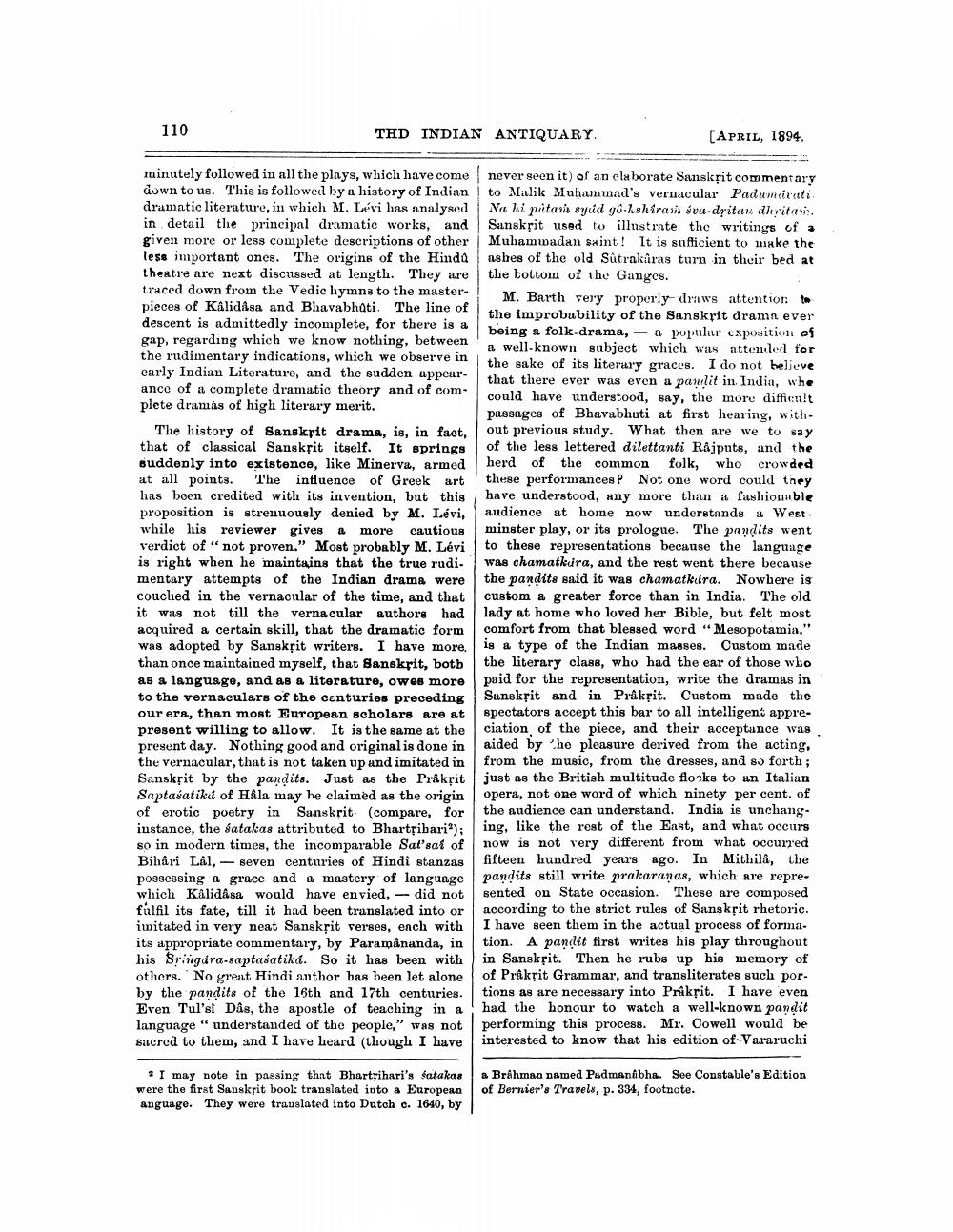________________
110
THD INDIAN ANTIQUARY.
[APRIL, 1894.
minutely followed in all the plays, which have come never seen it) of an elaborate Sanskrit commentary down to us. This is followed by a history of Indian to Malik Muhammad's vernacular Padumivuti dramatic literature, in which M. Lévi has analysed Nahi påtar sydd gulshfraina svu-dritur athyitav. in detail the principal dramatic works, and Sanskrit used to illustrnte the writings of a given more or less complete descriptions of other Muhammadan suint! It is sufficient to make the less important ones. The origins of the Hinda ashes of the old Sutrakaras turn in their bed at theatre are next discussed at length. They are the bottom of the Ganges. traced down from the Vedic hymns to the master
M. Barth very properly draws attentior: tn pieces of Kalidasa and Bhavabhati. The line of
the improbability of the Sanskrit dramn ever descent is admittedly incomplete, for there is a
being a folk-drama, - a popular exposition of gap, regarding which we know nothing, between
a well-known subject which was attended for the rudimentary indications, which we observe in
the sake of its literary graces. I do not believe carly Indian Literature, and the sudden appear.
that there ever was even a paulit in India, whe ance of a complete dramatic theory and of com
could have understood, say, the more difficult plete dramas of high literary merit.
passages of Bhavabhuti at first hearing, withThe history of Sanskrit drama, is, in fact,
out previous study. What then are we to say that of classical Sanskpit itself. It springs | of the less lettered dilettanti Rajputs, and the suddenly into existence, like Minerva, armed herd of the common folk, who crowded at all points. The influence of Greek art these performances ? Not one word could they has boen credited with its invention, but this have understood, any more than a fashionable proposition is strenuously denied by M. Levi, audience at home now understands a West. while his reviewer gives a more cautious minster play, or its prologue. The prandits went verdict of "not proven." Most probably M. Lévi to these representations because the language is right when he maintains that the true rudi. was chamatkura, and the rest went there because mentary attempts of the Indian drama were the pandits said it was chamatkıtra. Nowhere is couched in the vernacular of the time, and that custom a greater force than in India. The old it was not till the vernacular authors had lady at home who loved her Bible, but felt most acquired a certain skill, that the dramatic form comfort from that blessed word "Mesopotamia." was adopted by Sanskrit writers. I have more. is a type of the Indian masses. Custom made than once maintained myself, that Sanskrit, botb the literary class, who had the ear of those wbo as a language, and as a literature, owes more paid for the representation, write the dramas in to the vernaculars of the centurios preceding
Sanskrit and in Prakrit. Custom made the our era, than most European scholars are at
spectators accept this bar to all intelligent apprepresent willing to allow. It is the same at the ciation of the piece, and their acceptance was present day. Nothing good and original is done in aided by he pleasure derived from the acting, the vernacular, that is not taken up and imitated in from the music, from the dresses, and so forth; Sanskrit by the pandits. Just as the Pråkpit just as the British multitude flonks to an Italian Saptasatiku of Håla may he claimed as the origin opera, not one word of which ninety per cent. of of erotic poetry in Sanskrit (compare, for the audience can understand. India is unchanginstance, the Satakas attributed to Bhartfibari): ing, like the rest of the East, and what occu's so in modern times, the incomparable Sat'sal of now is not very different from what occurred Bihari Lal, - seven centuries of Hindi stanzas fifteen hundred years ago. In Mithild, the possessing a grace and a mastery of language pandits still write prakaranas, which are reprewhich Kalidasa would have en vied, did not sented on State occasion. These are composed fulfil its fate, till it had been translated into or according to the strict rules of Sanskrit rhetoric. imitated in very neat Sanskrit verses, ench with I have seen them in the actual process of forma. its appropriate commentary, by Paramananda, in tion. A pandit first writes his play throughout his Sringdra-saptašatiká. So it has been with in Sanskrit. Then he rubs up his memory of others. No grent Hindi author has been let alone of Prakṣit Grammar, and transliterates such porby the pandits of the 16th and 17th centuries. tions as are necessary into Prakrit. I have even Even Tul'si Dâs, the apostle of teaching in a had the honour to watch a well-known pandit language " understanded of the people," was not performing this process. Mr. Cowell would be sacred to them, and I have heard (though I have interested to know that his edition of Vararuchi
II may note in passing thnt Bhartrihari's fatakasa Brahman named Padmanabha. See Constable's Edition were the firat Sanskrit book translated into a European of Bernier's Travels, p. 334, footnote. anguage. They were translated into Dutch c. 1640, by




